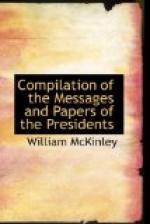This same peace conference acquiesced in our statement of the Monroe Doctrine as compatible with the purposes and aims of the conference.
The Monroe Doctrine should be the cardinal feature of the foreign policy of all the nations of the two Americas, as it is of the United States. Just seventy-eight years have passed since President Monroe in his Annual Message announced that “The American continents are henceforth not to be considered as subjects for future colonization by any European power.” In other words, the Monroe Doctrine is a declaration that there must be no territorial aggrandizement by any non-American power at the expense of any American power on American soil. It is in no wise intended as hostile to any nation in the Old World. Still less is it intended to give cover to any aggression by one New World power at the expense of any other. It is simply a step, and a long step, toward assuring the universal peace of the world by securing the possibility of permanent peace on this hemisphere.
During the past century other influences have established the permanence and independence of the smaller states of Europe. Through the Monroe Doctrine we hope to be able to safeguard like independence and secure like permanence for the lesser among the New World nations.
This doctrine has nothing to do with the commercial relations of any American power, save that it in truth allows each of them to form such as it desires. In other words, it is really a guaranty of the commercial independence of the Americas. We do not ask under this doctrine for any exclusive commercial dealings with any other American state. We do not guarantee any state against punishment if it misconducts itself, provided that punishment does not take the form of the acquisition of territory by any non-American power.
Our attitude in Cuba is a sufficient guaranty of our own good faith. We have not the slightest desire to secure any territory at the expense of any of our neighbors. We wish to work with them hand in hand, so that all of us may be uplifted together, and we rejoice over the good fortune of any of them, we gladly hail their material prosperity and political stability, and are concerned and alarmed if any of them fall into industrial or political chaos. We do not wish to see any Old World military power grow up on this continent, or to be compelled to become a military power ourselves. The peoples of the Americas can prosper best if left to work out their own salvation in their own way.
The work of upbuilding the Navy must be steadily continued. No one point of our policy, foreign or domestic, is more important than this to the honor and material welfare, and above all to the peace, of our nation in the future. Whether we desire it or not, we must henceforth recognize that we have international duties no less than international rights. Even if our flag were hauled down in the Philippines and Puerto Rico, even if we decided not to build the Isthmian Canal, we should need a thoroughly trained Navy of adequate size, or else be prepared definitely and for all time to abandon the idea that our nation is among those whose sons go down to the sea in ships. Unless our commerce is always to be carried in foreign bottoms, we must have war craft to protect it.




